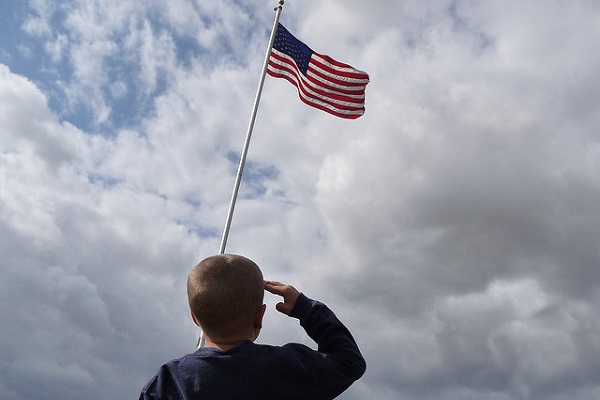
–>
February 15, 2023
Perhaps the most difficult thing in life is finding genuine contentment. We set goals for ourselves, we strive to reach them, and when we do, any momentary happiness goes poof awfully quickly, as we seek and set new goals once again. At some point, even the most driven and ambitious among us will wonder, “What am I doing, and why am I doing it?”
‘); googletag.cmd.push(function () { googletag.display(‘div-gpt-ad-1609268089992-0’); }); }
That is a good thing. I don’t have much figured out about this life, but I do believe we are meant to constantly ask ourselves the big questions: Why am I here? What is the point of our existence? Are there lessons I am supposed to learn along the way? What comes next?
The funny thing about asking big questions is that doing so tends to put all the things in life that ordinarily drag us down into startling perspective. It is only natural to get upset about domestic politics, higher fuel and food prices, growing censorship, and encroaching State tyranny. It is much more difficult to rise above those problems and keep trudging ahead. Eventually, all the turmoil either gets the better of us, or we realize that the turmoil — no matter how large in scope — still pales in comparison to the meaning of life. When you think in terms of why am I here and what am I meant to do, well, the terrible things around us start to look more like opportunities than problems.
That is also around the time when you realize that there is a distinction between happiness and joy. Whereas happiness brings a sense of pleasure and personal satisfaction, it is both ephemeral and misleading. What makes us happy today may leave us bored, distraught, or even angry tomorrow. Just as with setting and achieving goals, happiness won is soon lost. Joy, on the other hand, is a much more enduring state of being, a kind of spiritual triumph that exists when a person sees beyond the struggles of life and feels connected with something more. Can you find meaning and keep moving forward when nothing seems to be going your way? Can you distinguish between the things within your control and those that are not and accept the difference? Can you recognize that life is more than a quest for pleasure and comfort and see the value in struggle and pain? Do you have a bond with a loved one that is indestructible? If so, then you have no doubt experienced some measure of joy that is entirely yours and can never be taken away.
‘); googletag.cmd.push(function () { googletag.display(‘div-gpt-ad-1609270365559-0’); }); }
Experiencing joy connects us with the divine. We become acutely aware that we are both part of something much bigger than ourselves, as well as singularly in charge of our fates. Joyfulness clears out the clutter that keeps us from seeing truth clearly. It is a path toward inner peace. One breath at a time, recognize your life as something more than just a collection of days. Once you find joy and learn to guard it from the outside world, then problems look much different and sometimes melt away.
Most atheists I’ve met describe their understanding of existence in one of two ways: either as the mathematically preordained result of deterministic events or as the strange conclusion of a long string of random occurrences. Either the laws of physics determined that roughly 13.8 billion years after the Big Bang we would all be sitting around reading American Thinker together, or the unpredictable chaos of the universe took one wacky turn after the next until stumbling into our present reality. Either way, neither random chaos nor mathematical determinism leaves much room for notions of free will or a sacred understanding of life.
Since atheism is far more prevalent among political leftists, it seems counterintuitive that they get so angry when they do not get their way. I always think, “If there is no God and free will is imaginary, then why is it so imperative that the left’s worldview be imposed on everyone else? If life is no different than a pile of rocks and our choices are nothing more than complex math equations, then why can’t leftists stand back and accept the world as it unfolds?” Just as there never seem to be any atheists in a foxhole, there never seem to be any leftists inclined to forfeit the exercise of their own free will — especially when doing so would sacrifice their control over everyone else.
No matter how strenuously leftists describe human beings as nothing more than algorithms that can be hacked and programmed for optimal control, their efforts evince an uncomfortable understanding that we humans are much more than biological robots or complex chemical reactions with moving parts. Humanity’s future is predicated on deliberate choice — the choices of those who seek substantial control over everyone else and the choices of those who will refuse to be controlled. A battle is shaping between competing forces of free will. Within that battle, certain things ring true. To be alive is special. To be a part of this universe is special. To be conscious of our existence in such a vast world and yet to feel intimately connected to that vastness is special. We are not ones and zeroes. We are not simple code. We are part of something much greater.
Seen from this perspective, the events that dominate our days are very small. Joe Biden’s reckless policies do not matter. The Federal Reserve’s money printing does not matter. The growing national security surveillance State does not matter. The World Economic Forum’s attempts to remake and dominate the world do not matter. What matters is how each one of us responds to those threats and the choices we individually make.
People and institutions with power have a strong interest in convincing everyone else that fighting back is useless. They have a clear interest in convincing those they rule that there is no God by the side of the faithful who choose to pray. They have a Machiavellian interest in convincing human beings that they are not as worthy of protection as planet Earth’s rocks. They have an enduring interest in convincing each one of us that we are weak, alone, and small. They have every interest in keeping us from feeling connected to a greater purpose.
‘); googletag.cmd.push(function () { googletag.display(‘div-gpt-ad-1609268078422-0’); }); } if (publir_show_ads) { document.write(“
When we refuse to abide the will of powerful interests and instead ask the big, important questions in life, we make those with power feel uncomfortably small. We connect to things much larger than ourselves. We place ourselves on a path toward finding authentic joy. We open our lives to the helping hands of God. One breath at a time, one choice at a time, an amazing thing happens when you put yourself in His hands: the powers that be here on Earth become astonishingly weak.
Perhaps being a “joyful warrior” merely requires a willingness to trust in God so completely that courage vanquishes fear and the joy of righteous struggle replaces doubt. Rebellion to tyrants, Benjamin Franklin said, is obedience to God. That sentiment will always win out.

Image: Jeff Turner via Flickr, CC BY 2.0.
<!– if(page_width_onload <= 479) { document.write("
“); googletag.cmd.push(function() { googletag.display(‘div-gpt-ad-1345489840937-4’); }); } –> If you experience technical problems, please write to [email protected]
FOLLOW US ON
<!–
–>
<!– _qoptions={ qacct:”p-9bKF-NgTuSFM6″ }; ![]() –> <!—-> <!– var addthis_share = { email_template: “new_template” } –>
–> <!—-> <!– var addthis_share = { email_template: “new_template” } –>







